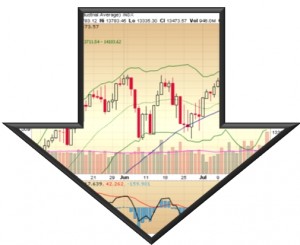 The stock markets have always been volatile to some degree. Each share sale changes the value of any given stock as buyers and sellers negotiate a fair price. What that fair price is depends on many different factors. The profitability of the company, the amount of debt on the books, and the estimated long term prospects of the company or the wider industry are just 3 of many influences on the price.
The stock markets have always been volatile to some degree. Each share sale changes the value of any given stock as buyers and sellers negotiate a fair price. What that fair price is depends on many different factors. The profitability of the company, the amount of debt on the books, and the estimated long term prospects of the company or the wider industry are just 3 of many influences on the price.Countries are valued in a similar way, through the value of their currency. The price of currencies fluctuate relative to one another based on a multitude of factors, including productivity numbers, gross domestic product, and the estimated long term prospects of the country as a whole.
The UK has experienced a lot of uncertainty and surprises in recent months.
The Brexit referendum result last summer injected a lot of uncertainty into the financial markets and caused a lot of volatility in both share prices of companies and in the the price of the pound itself relative to other currencies.
With the recent election result of the Conservative Party failing to win a majority, there is even more uncertainty politically, and by extension, financially. The capital markets do not like uncertainty and surprises. The day after the election the pound fell overnight as it became clear no party had gained an overall majority.
You may think the pound falling in value is a bad thing…
Another potential positive of the uncertainty is that traders can take advantage of the swings in price of sterling, using platforms like Alvexo. Will sterling strengthen over time? Will the Euro be affected by Brexit negotiations? Trading currencies and other securities could be very lucrative if you predict the movements correctly.
 The volatility in the markets and the price of sterling is sure to continue but to put the fall in sterling into context, the reaction of the markets to the election has been relatively muted. Sterling fell by just 1.7% on 9 June 2017, the day after the election result. This compares with an 8% drop on 24 June 2016, the day after the EU referendum vote.
The volatility in the markets and the price of sterling is sure to continue but to put the fall in sterling into context, the reaction of the markets to the election has been relatively muted. Sterling fell by just 1.7% on 9 June 2017, the day after the election result. This compares with an 8% drop on 24 June 2016, the day after the EU referendum vote.
It is therefore Brexit and its impact that investors and traders are looking at, particularly on the subject of the type of fiscal policy to be adopted. Regardless of the outcome there are opportunities and risks in different asset classes. For example, potential weakness in the economy due to the uncertain economic picture might be supportive for government bonds known as gilts. On the other hand, should the Brexit negotiations become dire and prospects of budget consolidation be delayed, there is the possibility of rising yields due to foreign accounts liquidating their ‘safe-haven’ positions in UK assets and increased risk premium.
Sterling, like the prime minster might not be strong and stable at this time, but there’s still opportunies to prosper if you know where to look. For most people, simply buying and holding is the best strategy for the hope and potential of long term growth, but for others, trading currencies and the markets in these volatile times could be immensely profitable.
You must log in to post a comment.